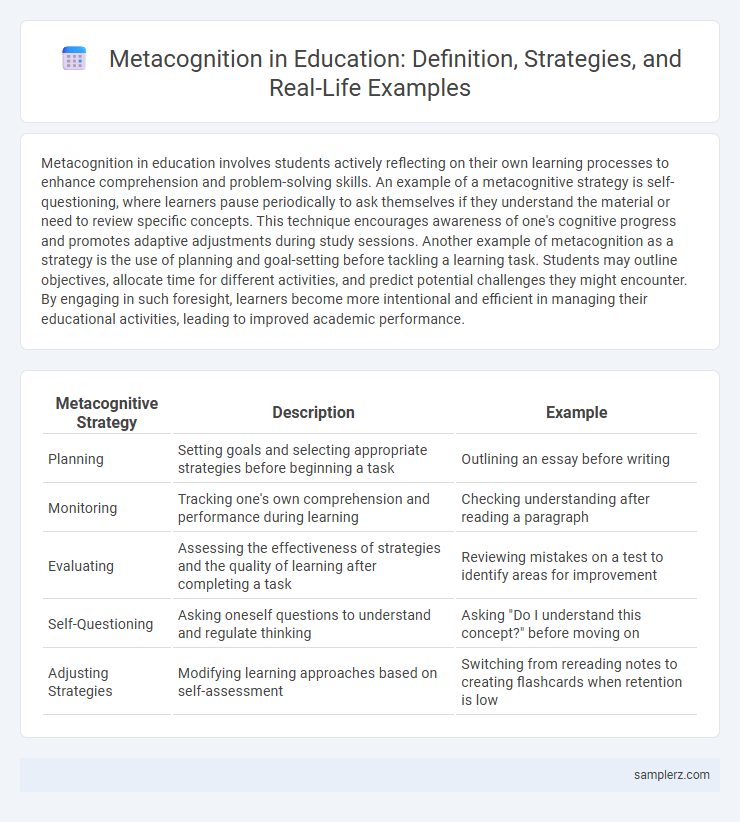Metacognition in education involves students actively reflecting on their own learning processes to enhance comprehension and problem-solving skills. An example of a metacognitive strategy is self-questioning, where learners pause periodically to ask themselves if they understand the material or need to review specific concepts. This technique encourages awareness of one's cognitive progress and promotes adaptive adjustments during study sessions. Another example of metacognition as a strategy is the use of planning and goal-setting before tackling a learning task. Students may outline objectives, allocate time for different activities, and predict potential challenges they might encounter. By engaging in such foresight, learners become more intentional and efficient in managing their educational activities, leading to improved academic performance.
Table of Comparison
| Metacognitive Strategy | Description | Example |
|---|---|---|
| Planning | Setting goals and selecting appropriate strategies before beginning a task | Outlining an essay before writing |
| Monitoring | Tracking one's own comprehension and performance during learning | Checking understanding after reading a paragraph |
| Evaluating | Assessing the effectiveness of strategies and the quality of learning after completing a task | Reviewing mistakes on a test to identify areas for improvement |
| Self-Questioning | Asking oneself questions to understand and regulate thinking | Asking "Do I understand this concept?" before moving on |
| Adjusting Strategies | Modifying learning approaches based on self-assessment | Switching from rereading notes to creating flashcards when retention is low |
Introduction to Metacognitive Strategies in Education
Metacognitive strategies in education involve self-awareness and regulation of one's learning processes, such as planning, monitoring, and evaluating understanding and performance. For example, students might use self-questioning techniques to assess their comprehension during a reading task or employ goal-setting to improve study habits. These strategies enhance critical thinking and foster independent learning, essential for academic success across disciplines.
Understanding Metacognition: Key Concepts
Metacognition in education involves students actively monitoring and regulating their cognitive processes, such as planning how to approach a learning task, evaluating their comprehension, and adjusting strategies for better outcomes. Key concepts include self-awareness of one's thinking patterns, the ability to predict performance, and the control over learning strategies to enhance retention and problem-solving skills. Effective metacognitive strategies empower learners to become more independent and reflective, ultimately improving academic achievement.
Planning as a Metacognitive Strategy Example
Planning as a metacognitive strategy involves students setting specific goals, outlining steps, and allocating resources before tackling a learning task. This proactive approach enhances comprehension and problem-solving by enabling learners to anticipate challenges and organize their efforts effectively. Research shows that students who consistently employ planning strategies demonstrate improved academic performance and greater self-regulation skills.
Self-Monitoring During Learning Tasks
Self-monitoring during learning tasks involves students actively tracking their comprehension and performance in real-time, using strategies such as asking themselves questions or summarizing key points. This metacognitive approach enhances awareness of cognitive processes, enabling immediate adjustments that improve retention and problem-solving skills. Research shows that learners who consistently self-monitor demonstrate higher academic achievement and greater ability to transfer knowledge across subjects.
Evaluating Learning Outcomes with Metacognition
Evaluating learning outcomes with metacognition involves students reflecting on their understanding and identifying areas where their comprehension may be incomplete or flawed. Techniques such as self-assessment checklists and reflective journaling enable learners to gauge the effectiveness of study strategies and adjust approaches accordingly. This process enhances critical thinking and promotes autonomous learning by encouraging ongoing monitoring and regulation of cognitive processes.
Metacognitive Questioning Techniques in the Classroom
Metacognitive questioning techniques in the classroom encourage students to reflect on their own thinking processes by asking questions such as "What strategies am I using to solve this problem?" and "How can I adjust my approach to improve understanding?" Implementing these techniques promotes self-awareness, enhances critical thinking skills, and supports students in developing independent learning strategies crucial for academic success. Teachers employing metacognitive questioning foster deeper comprehension and help learners monitor their progress effectively.
Reflection Journals: Tracking Thought Processes
Reflection journals serve as a powerful metacognitive strategy by allowing students to document and evaluate their thought processes during learning activities. This practice enhances self-awareness and critical thinking skills, enabling learners to identify strengths and areas for improvement. Consistent use of reflection journals promotes deeper understanding and fosters the development of independent learning strategies.
Setting Goals and Assessing Progress
Setting goals in education involves students identifying specific, measurable learning objectives that guide their study sessions and prioritize tasks effectively. Assessing progress requires learners to regularly evaluate their understanding and performance through self-quizzes, reflective journaling, or feedback analysis, enabling timely adjustments to their strategies. This metacognitive approach enhances academic achievement by promoting self-awareness and adaptive learning behaviors.
Collaborative Metacognition: Peer Discussion Strategies
Collaborative metacognition in education involves peer discussion strategies where students articulate their thinking processes, question each other's reasoning, and co-construct knowledge. Techniques such as reciprocal questioning, think-aloud protocols, and structured peer feedback enhance self-awareness and regulation of learning. These strategies improve critical thinking, deepen comprehension, and promote shared responsibility for cognitive development.
Practical Classroom Examples of Metacognitive Strategy Use
Students reflecting on their problem-solving steps during math exercises exemplify metacognitive strategy use, enhancing awareness of their cognitive processes. Teachers prompting learners to self-assess comprehension after reading assignments encourages regulation of understanding and adjustment of study methods. Group discussions where students articulate reasoning behind answers foster monitoring and control of learning strategies, improving academic performance.

example of metacognition in strategy Infographic
 samplerz.com
samplerz.com